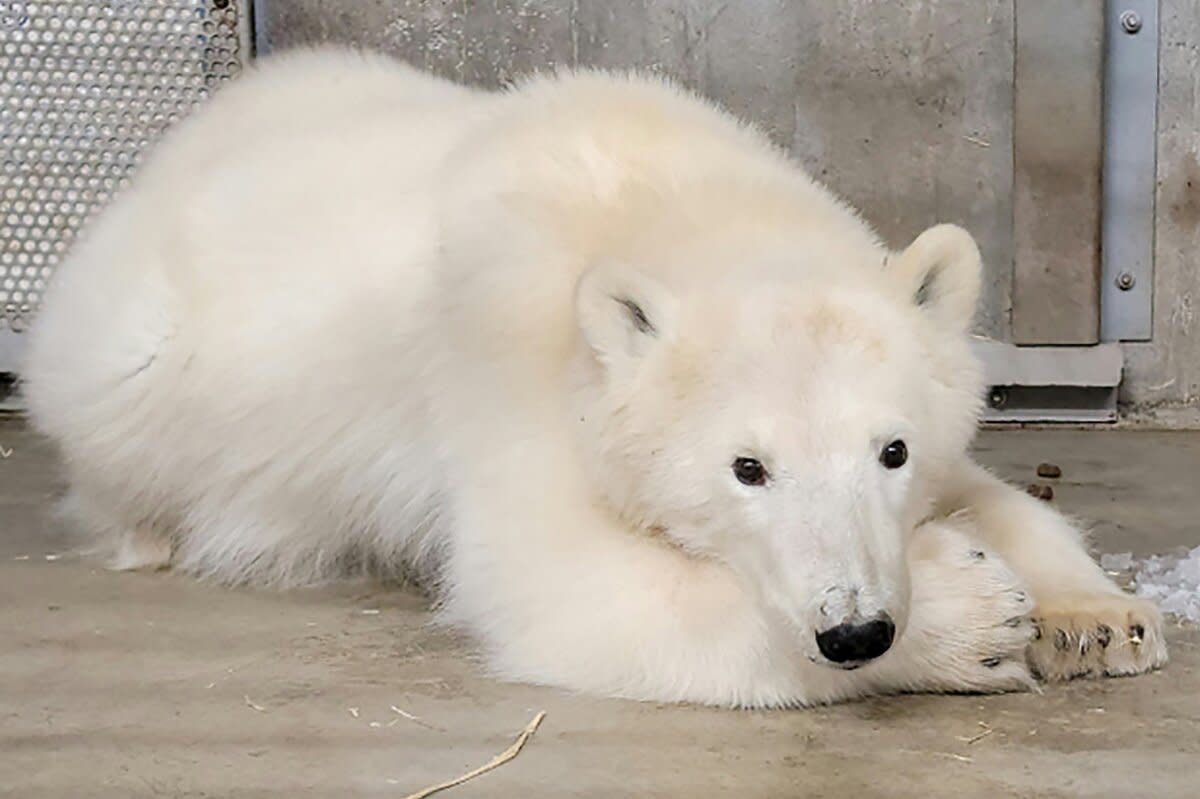Wild Polar Bear Cub Captured and Moved to Alaska Zoo in Rare Decision: 'Best Course of Action'

Alaska Zoo
A polar bear cub found alone near a populated area in Alaska has been captured by the U.S. Fish and Wildlife Service and sent to the Alaska Zoo after showing signs of being comfortable around humans.
According to a press release from the agency, the decision was made by polar bear program biologists and an Alaska Zoo veterinarian who feared for the welfare of the orphaned male bear, estimated to be around 11 months old.
RELATED: Climate Change Could Lead to Increase in 'Pizzly' Bears, a Polar Bear and Grizzly Bear Hybrid
The cub, whose behavior raised "concerns for potential human-bear conflicts," per the release, was taken to the zoo in Anchorage and will not be on public display until the young polar bear is in full health and the zoo deems it appropriate for the cub to be on exhibit.
Currently, the cub weighs 103 pounds — making it a little underweight — and has lacerations on its upper lip, which likely came from eating a fox, per the U.S. Fish and Wildlife Service. Officials spotted the cub eating the animal before its capture.
An orphaned polar bear cub was brought to the Alaska Zoo for his welfare by USFWS polar bear team biologists. Just a reminder that he is not yet in public view on zoo grounds. We will provided photos, videos & updates as we progress.https://t.co/Rnv7tA3cZK
📹T. Goodwin @FWSNEWS pic.twitter.com/bNdUEOmR72— The Alaska Zoo (@AlaskaZoo) December 22, 2022
"The decision to remove this bear from the wild was not made lightly," David Gustine of the polar bear program that reviewed the cub's situation said. "Removing a bear is not a good outcome for the individual or the wild population, but we felt it was the best course of action in this situation."
The Alaska Zoo's executive director Patrick Lampi said that the zoo's "primary concern is for the wellbeing of the cub," and given that the polar bear was seen eating a fox (a known rabies carrier in the area), the zoo has put "special extended quarantine procedures in place for this cub."
Never miss a story — sign up for PEOPLE's free daily newsletter to stay up-to-date on the best of what PEOPLE has to offer, from juicy celebrity news to compelling human interest stories.
After the animal's quarantine is complete, the U.S. Fish and Wildlife Service will decide on the animal's long-term care plan, but the polar bear will not be returned to the wild — where cubs remain with their mothers for up to 2.5 years. The last time a polar bear was taken from the wild was in 2013, when an orphaned bear named Kali in Point Lay was brought to the Alaska Zoo and then moved to the Saint Louis Zoo.
RELATED: Blizzard, Beloved Polar Bear at Point Defiance Zoo, Euthanized After 'Rapid Decline' in Health
The news of the Alaska Zoo's latest arrival comes months after Washington's Point Defiance Zoo & Aquarium humanely euthanized its beloved polar bear Blizzard in May. The bear was diagnosed with liver cancer in September 2021 and received chemotherapy and other supportive care before his May 8 death.
"It is with a heavy heart that we share the news that our beloved polar bear Blizzard was humanely euthanized yesterday after a rapid decline in his health. Blizzard was rescued as an orphaned cub in Churchill, Canada, before coming to Point Defiance Zoo in 1997. The elderly bear was diagnosed with liver cancer in Sept. 2021 and was receiving chemotherapy treatment and other supportive care to slow the progression of the disease," the zoo wrote on Facebook.
"At 26, he lived past the median life expectancy of 23 years for polar bears in human care. Blizzard inspired generations of guests from around the world to care about his species," the post added.
Polar bears are listed as threatened by the U.S. Fish and Wildlife Service, and the International Union for the Conservation of Nature's Species Survival Commission has designated them as facing a high risk of extinction.

